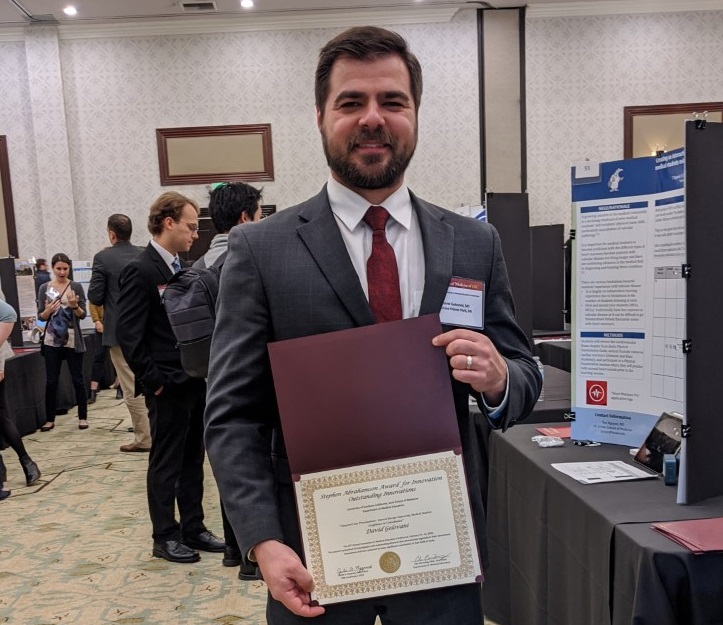Class of 2020 medical student David Gelovani’s research project on the importance of presenting subspecialty cases to student interest groups in medical schools earned accolades at the University of South California’s Keck School of Medicine Innovations in Medical Education conference, held Feb. 14-15 in Los Angeles.

Gelovani presented “Targeted Case Presentations: Interest Groups Improving Medical Student Confident in Consultation.” He received the Stephen Abrahamson Award for Innovation, presented to investigators with outstanding abstracts that demonstrate ingenuity in their educational innovations and have potential to make significant contributions in their field of study.
“I am honored to have won the Stephen Abrahamson Award for Innovation and am extremely proud of the efforts my colleagues and I have put into this project,” Gelovani said.
The abstract was one of only five accepted for a podium presentation for the topic “Presentations of Innovations: Teaching Methods.”
The conference pulled together a growing community of learners, teachers, scholars and leaders working to promote change through innovation in health professions education. The goal is to move education in the health professions toward a higher level of excellence and wellbeing by providing a forum for sharing ideas and educational innovations.
“I happened to be at the meeting giving a workshop. It was wonderful to see David at the meeting presenting. He did a wonderful job presenting and answered questions well. He is a credit to the Wayne State University School of Medicine,” said Internal Medicine’s Professor and Vice Chair of Education Diane Levine, M.D.
The faculty mentor and senior author on the study is Assistant Professor of Radiology Monte Harvill, M.D. ’92, who also directs his department’s medical student education initiatives.
The winning project was developed by WSU medical students with cases provided and/or reviewed by Dr. Harvill, who is also chief of Interventional Radiology at Harper University Hospital. Two contributors – Dr. Morris and Christian Chagas, M.D. -- are now residents.
“Andrew Bacyinski and I also developed the initial case presentations and are currently applying to Diagnostic Radiology and Internal Medicine residencies, respectively. Will Jeakle is a third-year medical student interested in Interventional Radiology who collected and sorted the data we collected and helped develop our oral presentation for Henry Ford Hospital’s conference. Samia Jaffar is a second-year medical student interested in Urology who performed all of the statistical analysis and is developing Urology cases for future studies,” Gelovani said.
The team found that many medical students entering clerkship rotations were not confident when placing subspecialty consultations and referrals.
“We attempted to utilize existing infrastructure and resources present at the School of Medicine to address this issue and developed a study integrating concepts of case-based learning and peer-to-peer learning through collaborations between existing subspecialty and primary care interest groups,” he said.
With interventional radiology, for example, they developed 12-minute presentations specific to the Internal Medicine, Family Medicine and Emergency Medicine interest groups, using cases demonstrating disease presentations common to each primary care specialty with sequelae requiring interventional radiology consultation. They studied preclinical student demographic information and self-identified knowledge and familiarity with interventional radiology scope and services, basic principles and techniques.
“This early collaboration between interest groups is easily scaleable to any medical school with interest groups, and fills in gaps in the undergraduate medical education curriculum and emphasizes self-directed learning among students with particular specialty interests,” Gelovani said. “It is especially important to develop these types of inter-physician communication and collaboration skills early to promote knowledge, confidence and professionalism among our students, as more than 50% of our nearly 300 graduates match into Michigan residencies where they may potentially be consulting each other.”
He added that early exposure to subspecialty medicine that would otherwise be limited may influence an undecided student’s career pursuits. “We recommend that starting interest group meetings with a case presentation with indications for referral by guests from other interest groups should become a standard of practice to develop competency, confidence and early networking among medical students as they assume advanced clinical duties in clerkship rotations.”
The study group now aims to reproduce the study with Physical Medicine and Rehabilitation, Urology, Cardiology, and other interest groups.